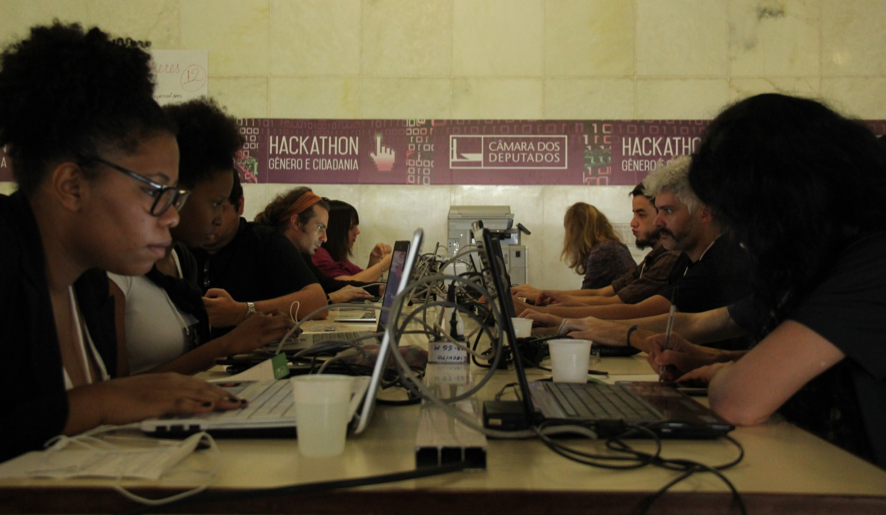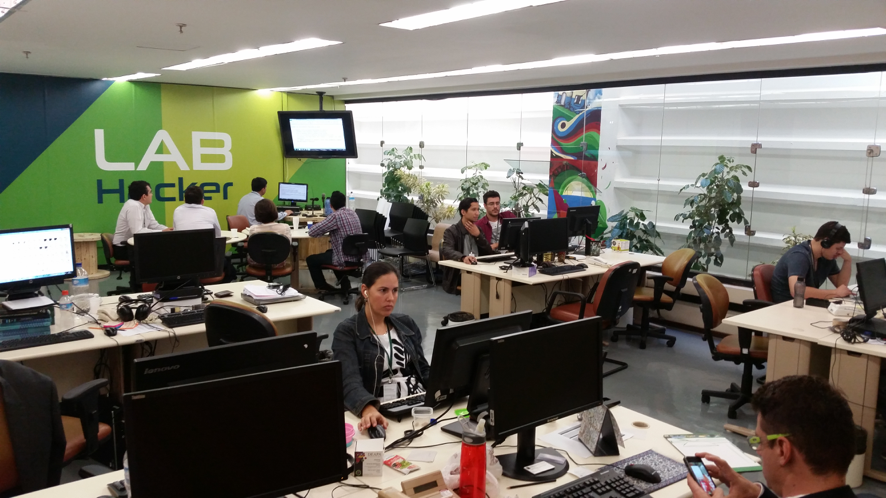Collaborative development in Labhacker: including the “external element”
by Digital Rights LAC on December 16, 2015
 With about a year and a half of existence, we now have a clear vision of the direction of an innovation lab focused on legislative citizenship. We’re talking about Hacker Laboratory of the Brazilian Chamber of Deputies, which was created from the conducting of a hackathon aimed at developing projects of transparency and participation in the federal legislative process, which took place in October 2013. The goal was to establish a permanent hackerspace in the House, so that these projects could be continued, as well as encourage the creation of new similar ideas.
With about a year and a half of existence, we now have a clear vision of the direction of an innovation lab focused on legislative citizenship. We’re talking about Hacker Laboratory of the Brazilian Chamber of Deputies, which was created from the conducting of a hackathon aimed at developing projects of transparency and participation in the federal legislative process, which took place in October 2013. The goal was to establish a permanent hackerspace in the House, so that these projects could be continued, as well as encourage the creation of new similar ideas.
By Cristiano Ferri*
Innovation labs in governments
The Labhacker came in the wake of innovation laboratories for citizenship that are emerging in various parts of the world. The MediaLab Prado in Madrid, the GovLab in Chile, the Policy Lab in the UK, and the MindLab in Denmark are some good examples, though more based on the work of the Executive. The Labhacker was conceived as a space for interaction that could house any citizen interested in legislative transparency or issues that facilitate interaction with Parliament. Currently, with free internet and space for free use, Labhacker is frequented by hackers, politicians, researchers, and others interested in the subject.
We know, however, that many of the applications developed on hackers marathons are prototypes, many of them still in a rudimentary stage, or non-functional. In general, they are not being continued by their authors. And the reason comes from the lack of resources for its realization and implementation difficulties of the initial idea. We think here in Labhacker, that we could help in the process of further development of this idea. With small multidisciplinary team, not more than ten people, made up of experts in information technology, project management, administration, law and other areas, we do some work to continue these projects and generate new ones.
For example, in the Hackathon 2013, one group of participants developed an application called Parliamentary Rhetoric, with innovative proposal of preview of the most trending topics in parliamentary speeches in the form of soap bubbles. As the project’s code is open, the staff here in the Labhacker made some improvements in it, changed the layout, included more databases and released a new version more functional.
And the social, where it enters?
Now, our main difficulty is to include the “external element” in Labhacker work processes. We believe, of course, that one of the most important values of a hacker space in the public service is the opening to anyone to develop ideas, projects and debates on citizenship – preferably that has to do with the Legislature, but not necessarily – being physically here or remotely.
So that collaborative action, networked, horizontal, transparent and interactive needs to be part of our DNA in Labhacker. But I will confess that, on a daily basis, it is not that easy and I explain better, exploring here the three dimensions that are part of our métier: the social universe, the bureaucracy and politics.
The restless politics
Let’s start backwards, talking about politics initially. The main difficulty in engaging parliamentarians in the Labhacker collaborative activities is the complicated and dynamic parliamentary agenda. Regardless of the profile of the deputy, if more intense, or more relaxed, if right wing or left wing, all without exception, have an agenda of unceasing professional activities, ranging from meetings in the many permanent and temporary committees, party meetings, parliamentary fronts meetings, to the attendance of countless people, social representatives, business people, councilors, mayors, in his office. Oh, one should also not forget the huge routine plenary, which runs from mid-afternoon until late evening. And there are other activities such as appointments with ministers and other political authorities to solve problems in their area.
Therefore, involve parliamentarians in hacking is not easy, because we have to compete for their time, attention and energy to this myriad of activities. We see that increasingly they are open to this type of action, some more, of course; others less, because many still do not understand fully what is to be hacker, which has been a controversial term. But when we can attract parliamentarians for the activities of Labhacker, they, in general, like, add a lot in the activities and some even start to incorporate/intensify certain interactive practices into their daily activities.
The sturdy bureaucracy
Let’s talk now of the bureaucratic part. And this is one of the most problematic. Me as a public servant for 22 years already experienced (and still going through) discouraging experiences, I will not deny, to implement innovations. Speaking the obvious: there is a lot of demotivation, lack of commitment, limited vision, individualistic action, corporatist sentiment, among other negative aspects of some public servants. Of course there are many other professionals open to improvements, struggling to innovate in their work and help a lot to bring new values for public administration.
Now, with the “Access to Information Law”, transparency became a rule. Not make public actions, information and data has become the exception. And that must be justified to occur. Also the State, according to this law, must be open to citizen participation in their activities. Well, that should mean total change of attitude in the conduct of the bureaucrat. But in practice it has not been so well, because there is still some blind obedience to secular proceedings and a generally conservative legal interpretation of the laws. And all to reiterate averse culture to the incorporation of citizens in the work processes of public administration and difficulty in seeing things from the side of society.
We will not invade your beach
To end this story, let’s now turn to the social side. There are growing proportion of interested transiting through Labhacker, participating in the hacking and developing projects on legislative transparency, political education and so on. In general, this participation has been sporadic, however. Some develop interesting projects but, for various reasons can not keep them or evolve them. As I said earlier, from what I gather, the main problem is the lack of resources to work on projects systematically.
In fact, contrary to what occurs in other countries, where foundations and NGOs can funding to develop and maintain projects on legislative transparency, in Brazil it has been much more complicated. The guys managed to make creative data visualization and intelligent applications at certain times of galvanizing efforts with collective action fronts, as hackers marathons and hackdays, and then need to return to their own work (which usually does not have much to do with that), and the projects are becoming aside.
Well, discussing solutions to these problems is a subject for another article because the matter is complex. Meanwhile, let’s bringing together politicians, public servants and hackers who are in order to develop interesting projects in this area and cool things are coming out. What for example? Take a look here at this link in our blog. Until next time.
*Cristiano Ferri is the Coordinator of Hacker Laboratory of the Chamber of Deputies. Twitter: @cristianofaria. Blog: labhackercd.net. Facebook: labhackercd






